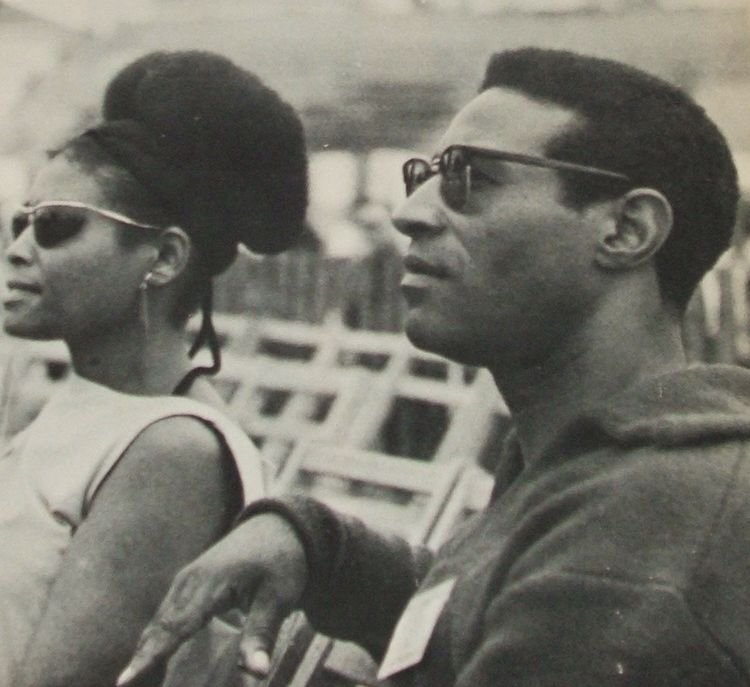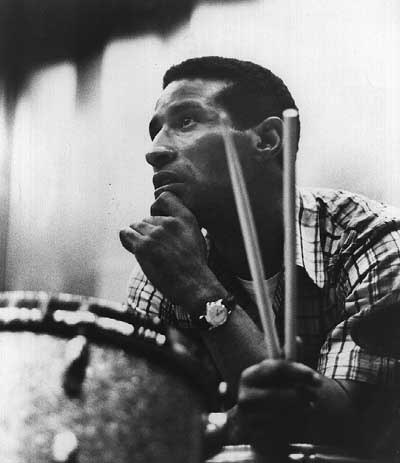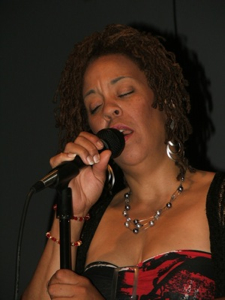
 Max Roach and Abbey Lincoln |
|
Story by Jean Timmons At the beginning of 1960, Max Roach recorded his composition We Insist! Freedom Now Suite, which, as the title suggests, represented a political statement. It was apt for the time; but, atypical of much protest music, Roach's composition had appeal beyond the times because of its musical qualities. The recent performance at Symphony Center confirmed and extended that estimation of the work.
Clarke initiated "Driva Man" by making music with various percussion instruments. He was soon joined by Dee Dee's strong vocal, which was hard, almost spoken. From beginning to end, Ms. Bridgewater would use her voice like an instrument, i.e., using sounds not words. Throughout, too, the structured development of the music united the performance. She carried the opening piece or served as a link to the introductory solos of the brass instruments. Nash was rather subdued but the percussion instrument was pounded on beat, as driven, while the bass was almost melodic. This piece built up the expectations of the audience. Very impressive music. With enough variation to create a sharp contrast to the opening segment, Dee Dee delivered strong yet simple lyrics to initiate "Freedom Day" and was joined by trumpeter Cecil Bridgewater, who delivered an outstanding solo. Lewis Nashs accompaniment was outstanding as well. At this juncture, Mantillo joined the group, adding the conga drums. Trombonist Priester and saxophonist Ron Bridgewater both made solid contributions, and bassist Coleman was a wonder. He maintained the steady rhythm while Nash seemingly connected or shored up the movement of the piece. At any rate, all the instruments and the voice tended toward oneness.
"All Africa" took on a "call and response" structure; and the entire group returned to the stage to continue the suite. The piece began with vocal music that was answered by percussions and brass. This beginning was rather tame compared to "Triptych," but it led to a dynamic interplay between percussionist Mantillo and Clarke. At one point, Ms. Bridgewater broke into African-like dances. Finally Nash entered this drumming, which was far from cacophonous. All drums and bass and all invigorating would be a fair estimation. Unlike drum solos that one wants to end, this was so inventive that one was keen for further development. It ended with the audience buzzing. While the audience still tingled from "All Africa," the group switched to "all jazz," as in expressive improvisational music. Coleman delivered a great bass solo to lead off "Tears for Johannesburg." He established a musical crying concept. Dee Dee entered with the percussions and her contribution to the concept was a wail to stir the heart. This idea continued with each brass instrument. Cecil produced nicely clear notes, with drums and bass pushing him along, his tears were so sad. Ron on tenor and Priester with trombone followed with improvisations that added to a pattern that was so satisfying, playing so fine. Could one expect tears from drums? Can the drums make tears? Yes. Nash did it. His music was unbelievable. Spirit of Max Roach.
|
 Dee Dee Bridgewater |
 Max Roach |
 Maggie Brown |